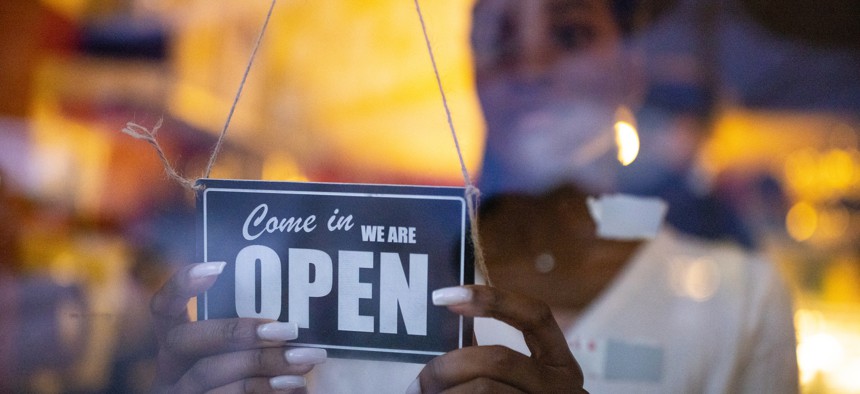Opinion: Rethinking the role of nonprofits in fight for racial and economic justice
Organizations can help BIPOC vendors flourish during COVID-19 by leveraging their spending power to create more opportunities

Luis Alvarez - Getty
For more than two years now, the COVID-19 pandemic has devastated New York State. While it has touched us all in different ways, its disproportionate impact on communities of color has exposed deep-rooted inequities within our social, political, and economic systems that require urgent attention and reforms. Now, as we have always done, our robust nonprofit community will need to come together to do our part in helping Black, indigenous and people of color (BIPOC) communities and small businesses recover.
According to areport by the House Small Business Committee, Black business ownership dropped more than 40% between February and April of 2020 during the pandemic – the largest of any racial group. Additionally,only 29% of Black-owned businesses successfully received federal relief through the Paycheck Protection Program, compared to 60% of white-owned businesses.
We have all seen the realities of these disparities firsthand. That’s why we need to build a nonprofit ecosystem in New York that is proudly committed to racial equity – one where we all make it a priority to proactively examine and identify greater opportunities for us to make it as employers and business leaders in the neighborhoods we serve.
While New York City already has a Minority and Women-Owned Business Enterprises (MWBE) program, which seeks to expand opportunities for minority and women entrepreneurs to access government contracts and grow their businesses, MWBE certification can be difficult for many minority-owned small businesses to achieve. In 2021, the city spent more than $30 billion on government contracts – butonly 3.8 % of those contracts were awarded to businesses owned by women and people of color.
Gov. Kathy Hochul and Mayor Eric Adams have both taken important steps to grow the MWBE program in recent weeks – including the allocation of$11 million in state funds to make the certification process more efficient, along with aplan to triple the city’s no-bid procurement threshold. However, nonprofits are still excluded from the program, which disqualifies an array of BIPOC vendors that work to support the nonprofit sector but cannot become MWBE certified.
In New York City alone, the nonprofit sector contributes over $77 billion annually to the local economy, provides jobs for more than 662,000 people, and represents nearly 5% of all establishments throughout the city. As major consumers of a wide array of services – including fiscal auditing, strategic consulting, waste management, landscaping, and more – nonprofits collectively spend tens of millions of dollars each year on externally sourced functions that support our organizations, our people, and our work.
So how can we leverage spending power to catalyze the changes we want to see across our city? Earlier this year,many of New York’s leading non-profit social service providerscame together to form the New York State Nonprofit Equitable Economies Coalition, with the goal of leveraging our collective economic power to dramatically increase opportunities for BIPOC vendors, contractors, and consultants.
But we still need help from more partners across the state to help us reach our goals in an effective and truly inclusive way. First, we want to bring all of our collective experiences, insights, and abilities together to create a toolkit of best practices and tactics to be agents of racial justice and equity in our communities. And second, we are going to create a first-of-its-kind database of BIPOC vendors, consultants, and contractors that we can all share as an industry. With all the diverse talent in New York state, there should never be an excuse for not extending opportunities for BIPOC businesses.
Ultimately, we must remember that the glaring social, political, and economic inequities that arose during the pandemic are all products of our country’s long history of systemic racism – not created by the virus itself. Let’s not miss this historic opportunity to come together with clear eyes and strong conviction to make change “business as usual” in New York once and for all.
